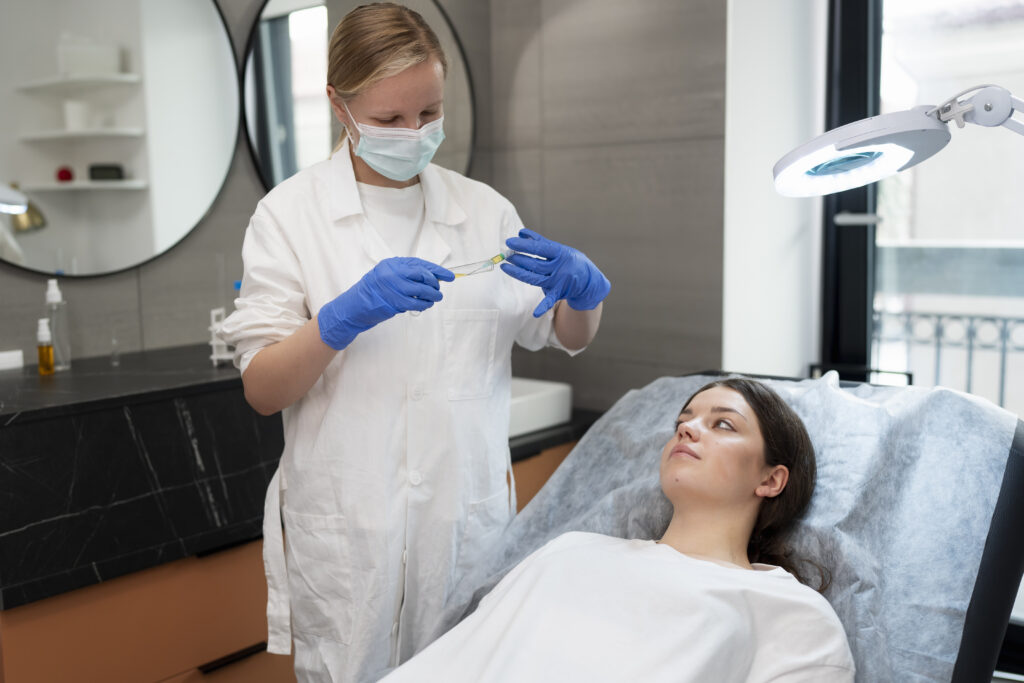If you’ve ever scrolled through Instagram or TikTok, you’ve probably seen that radiant, flawless, and dewy complexion everyone calls “glass skin.” Achieving this luminous glow isn’t just about makeup or filters—it’s about consistent skincare backed by science. If you’re tired of dull skin, clogged pores, or uneven tone, this guide will help you unlock dermatologist-approved glass Skin Treatments Best Skin doctor in indore that work for the long term.
By the end of this post, you’ll learn how to prep your skin, which professional treatments are most effective, and daily habits that ensure your glow lasts. Whether you want to reduce fine lines, improve hydration, or simply get that radiant glass-like finish, this guide has you covered.
What Exactly Is Glass Skin?
Before we dive into treatments, it’s essential to understand what glass skin actually means.
Glass skin is a term that originated in Korea and refers to a complexion that is:
- Smooth – minimal visible pores and texture.
- Clear – free of blemishes and discoloration.
- Dewy – with a natural reflective glow, almost like light passing through glass.
Unlike heavy highlighters or temporary makeup tricks, glass skin is all about healthy, hydrated, and nourished skin from within.
Why Glass Skin Requires Professional Guidance
While DIY routines are tempting, dermatologists emphasize that achieving and maintaining glass skin requires professional guidance for several reasons:
- Skin Sensitivity: Aggressive exfoliation or incorrect products can cause irritation.
- Targeted Treatments: Certain treatments like chemical peels, lasers, or HIFU require expertise for safe and effective results.
- Long-Term Health: Dermatologists focus not just on glow but on preventing premature aging, pigmentation, and skin damage.
Dermatologist-Recommended Treatments for Glass Skin
For a long-lasting glass skin effect, dermatologists often recommend combining a home routine with professional treatments.
1. Chemical Peels
- Peels remove dead skin and stimulate cell turnover.
- Types include glycolic acid, lactic acid, or TCA peels.
- Benefits: Smoother texture, reduced pigmentation, and enhanced radiance.
2. Microneedling
- Tiny needles create micro-injuries that stimulate collagen production.
- Improves fine lines, scars, and overall skin tone.
- Often paired with hyaluronic acid serums for an instant glow.
3. Laser Treatments
- Fractional CO2 and IPL lasers target pigmentation, dullness, and uneven texture.
- Results: Clearer, brighter skin with a reflective “glass-like” finish.
4. Hydrafacial
- Combines cleansing, exfoliation, extraction, hydration, and antioxidant infusion.
- Dermatologists love it because it’s safe for all skin types and delivers immediate glow.
5. Body HIFU or Non-Surgical Lifting
- For those concerned about sagging or dullness around the jawline and cheeks.
- Stimulates collagen and tightens skin without surgery.
Lifestyle Habits That Enhance Glass Skin
Even the best treatments will fade if your lifestyle doesn’t support healthy skin. Dermatologists emphasize:
1. Hydration
- Drink at least 2–3 liters of water daily.
- Consider herbal teas or water-rich fruits like watermelon and cucumber.
2. Nutrition
- Focus on a balanced diet rich in antioxidants, vitamins, and omega-3 fatty acids.
- Foods like berries, spinach, salmon, and nuts support skin health from within.
3. Sleep
- Skin repairs itself during deep sleep cycles. Aim for 7–9 hours per night.
4. Stress Management
- Chronic stress leads to dullness, breakouts, and premature aging.
- Practices like yoga, meditation, or breathing exercises can help.
5. Avoid Smoking & Excessive Alcohol
- Both accelerate aging and damage collagen.
Boosters for Glass Skin
Dermatologists also recommend certain at-home boosters to maintain the glow:
- Sheet masks enriched with hyaluronic acid and peptides.
- Facial massage using jade rollers or gua sha to improve circulation.
- DIY hydration packs with aloe vera or honey (for sensitive skin, always patch test).
Daily Skincare Routine for Glass Skin after Treatments
Consistency is key. dermatologist in indore near me, recommend a step-by-step daily routine for long-term results:
1. Double Cleansing for Deep Clean
- Step 1: Use an oil-based cleanser to remove makeup and sunscreen.
- Step 2: Follow with a gentle water-based cleanser to wash away dirt and sweat.
2. Exfoliation – Gentle but Regular
- Use chemical exfoliants like AHAs (glycolic acid) or BHAs (salicylic acid) 2-3 times a week.
- Helps remove dead skin cells and improves skin texture.
3. Hydrating Toners and Essences
- Toners prep your skin to absorb serums effectively.
- Look for ingredients like hyaluronic acid, glycerin, and niacinamide to lock in moisture.
4. Targeted Serums
- Use serums based on your skin concerns:
- Vitamin C: Brightens and evens skin tone.
- Peptides: Boost collagen for firmness.
- Hyaluronic acid: Maintains hydration for that plump, glassy finish.
5. Moisturizer – Lock in the Glow
- Choose a lightweight, non-comedogenic moisturizer.
- Dermatologists suggest layering gel-based moisturizers in summer and cream-based in winter.
6. Sun Protection – The Ultimate Anti-Aging Step
- Daily SPF 30+ prevents pigmentation, wrinkles, and dullness.
Even indoor light exposure matters—consider mineral-based sunscreen.
Common Myths About Glass Skin
Let’s debunk some misconceptions:
- “Glass skin is only for women.” – False. Men can also achieve radiant skin.
- “You need expensive products.” – Not necessarily. Consistency and the right ingredients matter more than price.
- “It’s purely aesthetic.” – While glow looks great, it reflects healthy skin barriers and hydration levels.
Frequently Asked Questions (FAQ)
Q1: How long does it take to get glass skin?
A: With proper routine and treatments, noticeable results appear in 4–6 weeks. Professional treatments can accelerate the process.
Q2: Can I achieve glass skin naturally?
A: Yes, but it requires consistent hydration, sun protection, exfoliation, and a nutrient-rich diet.
Q3: Are chemical peels safe for sensitive skin?
A: Mild peels like lactic acid or enzyme peels are generally safe, but always consult a dermatologist first.
Q4: How often should I get professional treatments?
A: Most treatments are recommended once a month, but frequency depends on your skin type and concerns.
Conclusion
Achieving glass skin treatment isn’t about luck—it’s about science, consistency, and care. By following a structured skincare routine, incorporating dermatologist-recommended treatments, and maintaining healthy lifestyle habits, anyone can enjoy that long-lasting glow.
Remember, every skin type is unique. Consult a dermatologist before starting treatments, and always prioritize gentle, hydrating products.
Ready to get your glow on? Start with one step today—whether it’s hydrating better, using a serum, or booking a professional facial. Your glass skin journey starts now!



